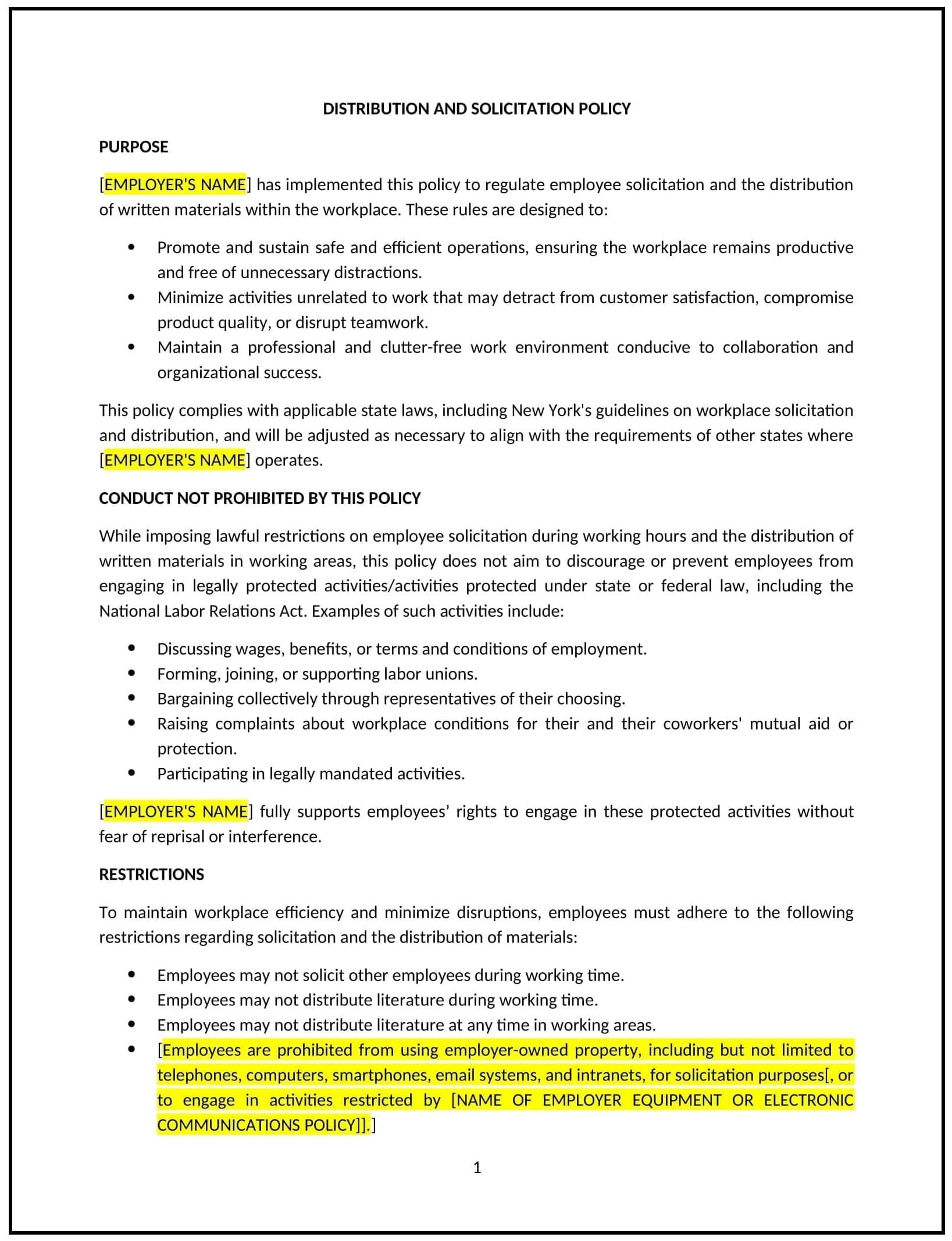Distribution and solicitation policy (New York): Free template
Got contracts to review? While you're here for policies, let Cobrief make contract review effortless—start your free review now.

Customize this template for free
Distribution and solicitation policy (New York)
A distribution and solicitation policy helps New York businesses regulate the distribution of materials and solicitation activities within the workplace. This policy sets clear guidelines for employees, visitors, and third parties regarding where, when, and how materials can be distributed, and when solicitation activities are permitted. The policy balances the need for open communication and the business’s right to maintain an orderly and efficient work environment.
By implementing this policy, businesses can reduce disruptions, maintain a productive workplace, and comply with applicable legal requirements while safeguarding employees' rights to free expression.
How to use this distribution and solicitation policy (New York)
- Define distribution and solicitation: Clearly explain what constitutes distribution (e.g., handing out flyers, brochures, or other materials) and solicitation (e.g., asking for donations, selling items, or seeking signatures) within the workplace. Specify any activities that are considered disruptive or inappropriate.
- Establish permitted areas and times: Specify where and when distribution and solicitation activities are allowed, including guidelines for specific areas (e.g., common areas, break rooms) and times (e.g., during lunch breaks or outside of working hours). Ensure that areas and times are reasonable and do not interfere with business operations.
- Set guidelines for approval: Outline the process for obtaining approval to distribute materials or engage in solicitation activities. The policy should specify who is responsible for granting approval (e.g., HR, management) and what information is required (e.g., purpose, materials).
- Prohibit disruptive activities: Make it clear that disruptive solicitation or distribution activities are not allowed, such as activities that interrupt employees’ work or invade personal space. This could include aggressive selling, excessive noise, or unauthorized approaches to customers or clients.
- Address third-party solicitation: Specify whether non-employees (e.g., salespeople, vendors, or outside organizations) can solicit or distribute materials on business premises. If allowed, outline the procedure for third-party solicitation, including approval processes and guidelines for respectful conduct.
- Ensure legal compliance: Make sure the policy complies with applicable local, state, and federal laws, including New York’s labor laws and any legal rights employees have regarding solicitation or distribution activities in the workplace.
Benefits of using this distribution and solicitation policy (New York)
This policy offers several benefits for New York businesses:
- Maintains a productive work environment: By limiting distribution and solicitation activities, businesses can prevent unnecessary distractions and maintain an efficient work environment where employees can focus on their tasks.
- Reduces legal risks: The policy helps businesses comply with New York state and federal laws regarding workplace solicitation and distribution, reducing the risk of legal claims or conflicts.
- Promotes fairness and consistency: By setting clear guidelines and a standardized process for requesting approval, businesses ensure that all employees are treated fairly and consistently when it comes to distributing materials or engaging in solicitation activities.
- Protects employee privacy: The policy helps protect employees' personal space by setting boundaries for solicitation activities, ensuring that employees can work without unwanted interruptions.
- Enhances business reputation: A well-communicated distribution and solicitation policy signals to employees and visitors that the business is professional and committed to maintaining an orderly and respectful environment.
Tips for using this distribution and solicitation policy (New York)
- Communicate the policy clearly: Ensure all employees are aware of the policy, including the rules for distributing materials and engaging in solicitation activities. This can be done through employee handbooks, onboarding materials, and internal communications.
- Be consistent in enforcement: Apply the policy consistently to all employees and third parties, ensuring that approval processes are followed and that any violations are addressed fairly.
- Monitor activities regularly: Regularly monitor distribution and solicitation activities within the workplace to ensure compliance with the policy. Address any instances of disruptive behavior promptly to maintain a productive environment.
- Offer alternatives for communication: If employees or third parties are not allowed to solicit or distribute materials in the workplace, consider providing alternative channels for communication, such as designated bulletin boards or an internal newsletter.
- Review and update the policy regularly: Periodically review the policy to ensure it remains relevant, compliant with any changes in law, and aligned with the evolving needs of the workplace.